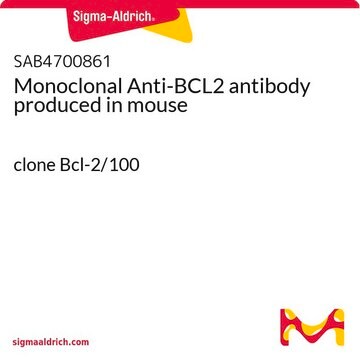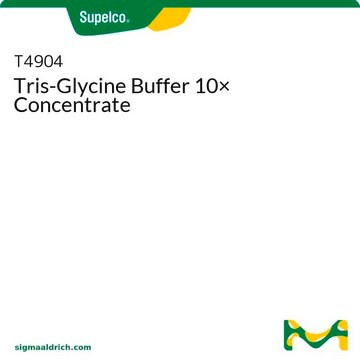05-729
Anti-Bcl2 Antibody, clone 100
clone 100, Upstate®, from mouse
Synonyme(s) :
B-cell CLL/lymphoma 2, B-cell lymphoma protein 2
About This Item
Produits recommandés
Source biologique
mouse
Niveau de qualité
Forme d'anticorps
purified immunoglobulin
Clone
100, monoclonal
Espèces réactives
feline, canine, human
Fabricant/nom de marque
Upstate®
Technique(s)
flow cytometry: suitable
immunohistochemistry: suitable (Paraffin)
western blot: suitable
Isotype
IgG1
Numéro d'accès NCBI
Numéro d'accès UniProt
Conditions d'expédition
dry ice
Modification post-traductionnelle de la cible
unmodified
Informations sur le gène
human ... BCL2(596)
Description générale
Spécificité
Immunogène
Application
Western Blotting Analysis: 1μg/mL of this antibody detected Bcl2 in Raji cell lysate.
Immunohistochemistry (Paraffin) Analysis: A 1:1,000 dilution of this antibody detected Bcl2 in Human tonsil tissue sections.
Qualité
Western Blot Analysis:
0.5-2 µg/mL of this lot detected Bcl2 in a Raji RIPA cell lysate.
Description de la cible
Liaison
Forme physique
Stockage et stabilité
Handling Recommendations:
Upon receipt, and prior to removing the cap, centrifuge the vial and gently mix the solution. Aliquot into microcentrifuge tubes and store at -20ºC. Avoid repeated freeze/thaw cycles, which may damage IgG and affect product performance. Note: Variability in freezer temperatures below -20ºC may cause glycerol-containing solutions to become frozen during storage.
Remarque sur l'analyse
Tonsil tissue.
Autres remarques
Informations légales
Clause de non-responsabilité
En option
Code de la classe de stockage
12 - Non Combustible Liquids
Classe de danger pour l'eau (WGK)
WGK 1
Point d'éclair (°F)
Not applicable
Point d'éclair (°C)
Not applicable
Certificats d'analyse (COA)
Recherchez un Certificats d'analyse (COA) en saisissant le numéro de lot du produit. Les numéros de lot figurent sur l'étiquette du produit après les mots "Lot" ou "Batch".
Déjà en possession de ce produit ?
Retrouvez la documentation relative aux produits que vous avez récemment achetés dans la Bibliothèque de documents.
Notre équipe de scientifiques dispose d'une expérience dans tous les secteurs de la recherche, notamment en sciences de la vie, science des matériaux, synthèse chimique, chromatographie, analyse et dans de nombreux autres domaines..
Contacter notre Service technique







